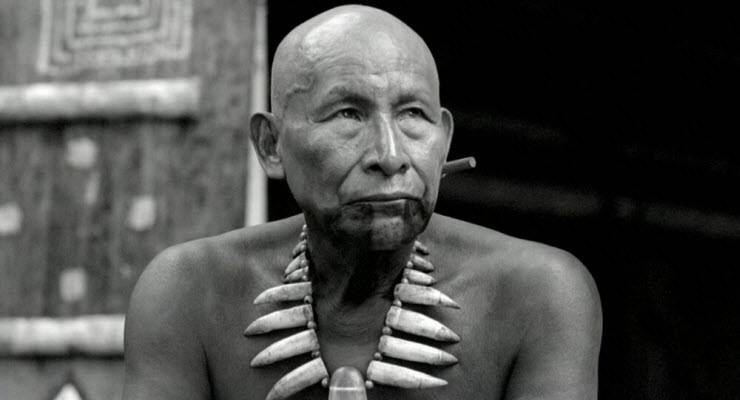
As the pandemic advances inexorably in Latin America, the wretched tales of loss and suffering are never-ending. And one of those tales is making the region’s indigenous communities deeply alarmed — the death of their tribal elders.
Antonio Bolívar was one of them. He was chief of the Colombian indigenous Ocaina community. Bolívar was a wise man. He was also a celebrity. He played the role of shaman “Karamakate” in the 2015 award-winning Colombian film Embrace of the Serpent. On April 30, the pandemic killed him. He was 75.
The death of indigenous elders is “tragic”, read a statement of the National Indigenous Organization of Colombia (ONIC). The statement said that more than 66.7% of Colombian indigenous who died from COVID-19 were over the age of 60. Those who are dying, ONIC noted, “are the elders — those who hold millennial knowledge, passed from generation to generation”.
Latin America is home to 42 million indigenous people, according to World Bank data. Amid the health crisis, the Inter-American Commission on Human Rights (IACHR) pronounced them as communities “in a situation of particular vulnerability”.
And within this vulnerability, tribal elders are the most vulnerable. In Mexico, around 2 million indigenous elders are at risk from the pandemic, according to the National Institute of Indigenous People.
The death of the wise men and women is becoming, as anthropologist and professor Natalia Milla told me on the phone from Chile — “a tragedy of incommensurable impact”. Professor Milla is Mapuche — the indigenous nation found in Chile and Argentina.
She described Mapuche “kimches”, or elders, as the “holders of Mapuche knowledge”. In a history marked by invasion, the elders are, she said, “the sandstone of indigenous existence and preservation”.
If the elders die, she told me, “our culture dies a little too”.
In Brazil, one of the world’s most severely affected countries, the death of tribal elders is rapidly increasing. Only in June the indigenous Munduruku nation, in the Amazon River basin, had already lost 10 wise men. “We used to say we’re living libraries,” said Alessandra Korap, a Munduruku wise woman and chief, to Portugal’s Express newspaper.
In a region where indigenous children have serious problems accessing education, the tribal elders are the community educators. Eduardo Wipio Deykat was a much revered one. A Peruvian Awajún nation elder, Wipio Deykat was a dogged promoter of bilingual intercultural education. He died last July along with two other elders, Fra Quiaco Inchipis and Francisco Quiaco. “The disease is taking the Awajún wise men,” posted Amazon Watcher, an indigenous media platform.
Latin American tribal elders are not only the holders and bastions of traditional knowledge -/- they are also a solid fortress in defence of their land and people. They are the first line of resistance against the ethnocide perpetrated by institutions of the state.
Santiago Manuin, a leader of Peru’s Awajún indigenous community, was one of them. Manuin, who in 2009 survived the impact of eight bullets during a pro-indigenous rights rally, was a world figure in defence of the Amazon. On July 1, aged 61, he lost the battle against COVID-19.
The death of Manuin came a few weeks after the death of Paulinho Paiakan. The legendary indigenous leader and elder of Brazil’s Kayapo people, Paiakan succumbed to the virus in June, at age 66. He is remembered for his resistance to the advances of illegal loggers and miners into his territory in the Xingu river basin in the states of Mato Grosso and Pará.
José Tijé Huarao used to be called “kuraka” — a political leader in Quechua, Peru’s indigenous language. As an elder and tribal chief of the Arasaeri people, in the Peruvian province of Madre de Dios (Mother of God), Tijé worked his entire life for the preservation of his ethnic group and fought against the invasion of illegal gold miners.
“One of the few wise men who knew the indigenous worldview of the Arasaeri people has ceased to exist today July 14, 2020, at the age of 81,” read a communique from Native Federation of the Madre de Dios River and Tributaries (FENAMAD), an organization of indigenous communities.
“The repositories of traditional knowledge that serve as a source of research or knowledge to future generations are disappearing,” said Jorge Pérez, President of the Peruvian Regional Organization of Indigenous Peoples of the East (ORPIO). “This is a cost, you can say, very high.”
Before the pandemic struck, many made the journey to the Colombian Amazon to meet Antonio Bolívar, the Ocaina indigenous elder who died in April. The travellers wanted to hear the stories from “el abuelo”, as Bolivar was known in Leticia, his home in southern Colombia.
Perhaps Bolívar told travellers about a dream he had. The dream he told the white explorer in a memorable scene of Embrace of the Serpent. “I once dreamed of a white spirit who was sick, the only way he could heal was to learn to dream.”







The whole world will be poorer for this immense loss of knowledge.
This is so sad, real knowledge and history, not transcribed, lost forever like a cave blown up by Rio Tinto.
There are secrets in the Dreaming. White man will be the last to learn them.